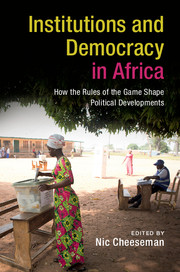Book contents
- Frontmatter
- Dedication
- Contents
- List of Figures
- List of Tables
- List of Contributors
- 1 Introduction: Understanding African Politics: Bringing the State Back In
- Part I Institutional Foundations
- Part II Law and Order
- Part III Elections, Parties and Political Competition
- 8 Political Parties: Presidential Succession Crises and Internal Party Democra
- 9 Elections: The Power of Elections in Multiparty Africa
- 10 Electoral Rules: The Relationship between Political Exclusion and Conflict
- 11 Term Limits: Leadership, Political Competition and the Transfer of Power
- Part IV Countervailing Institutions
- Index
- References
8 - Political Parties: Presidential Succession Crises and Internal Party Democra
from Part III - Elections, Parties and Political Competition
Published online by Cambridge University Press: 05 February 2018
- Frontmatter
- Dedication
- Contents
- List of Figures
- List of Tables
- List of Contributors
- 1 Introduction: Understanding African Politics: Bringing the State Back In
- Part I Institutional Foundations
- Part II Law and Order
- Part III Elections, Parties and Political Competition
- 8 Political Parties: Presidential Succession Crises and Internal Party Democra
- 9 Elections: The Power of Elections in Multiparty Africa
- 10 Electoral Rules: The Relationship between Political Exclusion and Conflict
- 11 Term Limits: Leadership, Political Competition and the Transfer of Power
- Part IV Countervailing Institutions
- Index
- References
Summary
‘Modern democracy’ – Schattschneider (1942: 1) wrote – ‘is unthinkable save in terms of political parties’. By contesting elections, participating in parliament and taking grievances to court rather than to the streets, parties encourage citizens to regard democratic politics as morally and procedurally legitimate. By representing constituents in the corridors of power, they render public policymaking accountable and expose instances of official malfeasance. By recruiting, training and socialising political actors, they bring fresh talent into the system and ensure that democratic ideals are imbibed at the highest levels of society. And by creating, nurturing and reproducing societal coalitions – with the capacity to secure an electoral majority – they bring together groups with conflicting interests and so facilitate social cohesion. A representative democracy without effective political parties, in other words, is akin to an engine without moving parts.
African parties, however, have a bad reputation. Far from exercising power for the common good, ruling parties are said to intimidate opponents, politicise security forces and erode the boundaries between party, government and state. Far from recruiting fresh talent, they affect an endless circulation of elites, with the discredited autocrats of yesteryear moving from party to party without ever relinquishing power. Far from building broad-based alliances capable of reconciling interests and managing conflict, they seek short-term electoral advantage by fanning the flames of ethnic hatred. And far from establishing acceptable norms of political behaviour, opposition parties attack rivals, denigrate judiciaries and cry foul over electoral defeat even when the popular will has been unambiguously expressed. Little wonder, then, that African parties are often regarded as the ‘weak link in the chain of elements that together make for a democratic state’ (Randall and Svåsand 2002: 31).
Most African parties, of course, have a constitution intended to define objectives, guarantee rights and responsibilities, establish institutions and place limits on the exercise of political power. These rules, however, tend to exist only on paper. Indeed, few African parties have a grassroots membership capable of effecting vertical accountability or influencing policy, in part because internal party organisation is sustained by the personal fortunes of ‘big men’. Fewer still have a professional bureaucracy capable of applying party statute, conducting policy research and creating checks on presidential power.
- Type
- Chapter
- Information
- Institutions and Democracy in AfricaHow the Rules of the Game Shape Political Developments, pp. 191 - 212Publisher: Cambridge University PressPrint publication year: 2018
References
- 2
- Cited by



